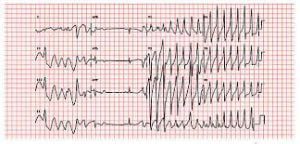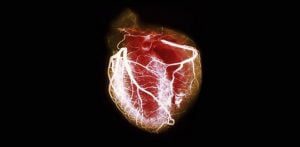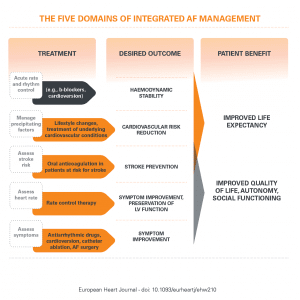Atrial Fibrillation
- Atrial fibrillation (AF) is an irregular and often rapid heart rate that can increase your risk of stroke, heart failure and other heart-related complications.
- During atrial fibrillation, the upper two chambers (the atria) of heart beat chaotically and irregularly out of coordination with the two lower chambers (the ventricles).
- Atrial fibrillation (AF) prevalence increases with age, making it the most common arrhythmia in patients older than 65 years.
- Symptoms often include heart palpitations, shortness of breath and weakness.

Risk factors
- Age

- Heart disease
- High blood pressure
- Other chronic conditions
- Drinking alcohol
- Obesity
Symptoms
- Palpitations, which are sensations of a racing, uncomfortable, irregular heartbeat or a flip-flopping in chest

- Weakness
- Reduced ability to exercise
- Fatigue
- Lightheadedness
- Dizziness
- Shortness of breath
- Chest pain
Causes of Atrial Fibrillation
- High blood pressure
- Heart attack
- Coronary artery disease
- Abnormal heart valves
- Heart defects you’re born with (congenital)
- An overactive thyroid gland or other metabolic imbalance
- Exposure to stimulants, such as medications, caffeine, tobacco or alcohol
- Sick sinus syndrome — improper functioning of the heart’s natural pacemaker
- Lung diseases
- Previous heart surgery
- Viral infections
- Stress due to surgery, pneumonia or other illnesses
- Sleep apnea
Diagnosis

- Electrocardiogram
- Echocardiogram
- Chest X-ray
- Blood test
Treatment
Treatment options may include one or more of the following:
- Antiplatelets and Anticoagulants: Functions to prevent blood clot or treat an existing blood clot. Examples include: Low dose Aspirin, Warfarin, Rivaroxaban and Apixaban.
- Beta blockers: Drugs used to slow the heart rate. Some examples include: Atenolol, and Bisoprolol.
- Calcium channel blockers: These medications have multiple effects on the heart. They are used to slow the heart rate in patients with AF and to reduce the strength of the muscle cell’s contraction. Some examples include: Dilitiazem, and Verapamil.
- Sodium channel blockers: These medications help the heart’s rhythm by slowing the heart’s ability to conduct electricity. Examples may include: Flecainide and Propafenone.
- Non-Surgical Treatment
- Electrical cardioversion: A procedure in which an electrical shock is given on outside of chest (while under mild anesthesia) using either paddles or patches.
- Radiofrequency ablation or catheter ablation: The catheter tip is used to destroy the tissue that is sending the extra currents to return it to normal heart rhythm.
- Surgical Procedures for Atrial Fibrillation

- Pacemakers Implantation: A small electrical device implanted under the skin near the collarbone with wires going to the heart to regulate the heartbeat.
Prevention
- Eating a heart-healthy diet
- Increasing your physical activity
- Avoiding smoking
- Maintaining a healthy weight
- Limiting or avoiding caffeine and alcohol
- Reducing stress, as intense stress and anger can cause heart rhythm problems
- Using over-the-counter medications with caution, as some cold and cough medications contain stimulants that may trigger a rapid heartbeat
Complications
- Stroke. A blood clot could dislodge from heart and travel to your brain. There it might block blood flow, causing a stroke.
- Heart failure. Atrial fibrillation, especially if not controlled, may weaken the heart and lead to heart failure — a condition in which heart cannot circulate enough blood to meet your body’s needs.



